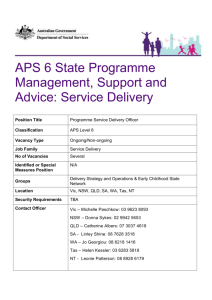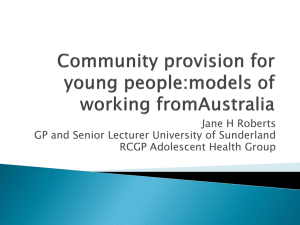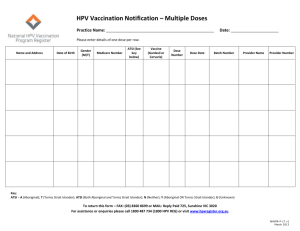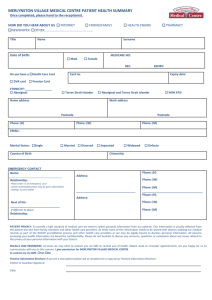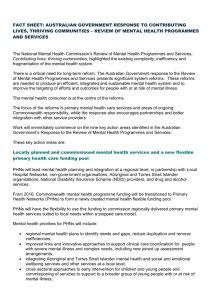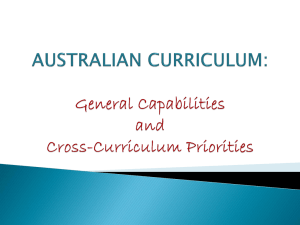Summary of actions within the Australian Government response to
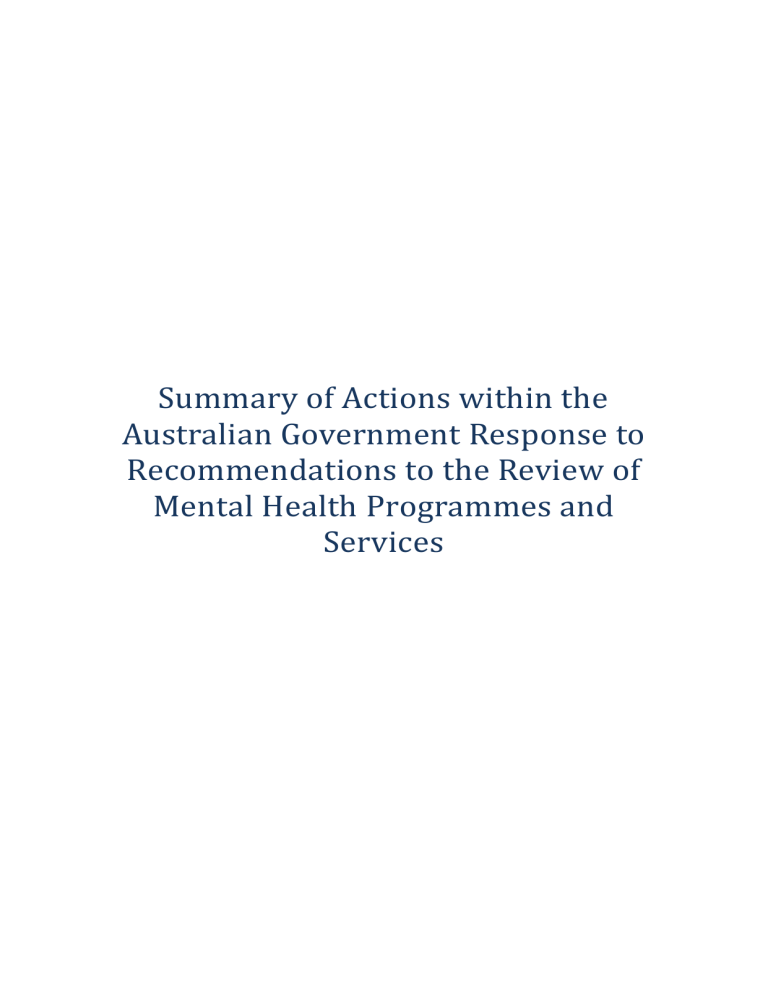
Summary of Actions within the
Australian Government Response to
Recommendations to the Review of
Mental Health Programmes and
Services
Table of Contents
2. Develop, agree and implement a National Mental Health and Suicide Prevention
3. Urgently clarify the eligibility criteria for access to the National Disability
8. Extend the scope of Primary Health Networks (renamed Primary and Mental
18. Establish Mental Health and Social and Emotional Wellbeing Teams in
Indigenous Primary Health Care Organisations (including Aboriginal Community
Strategic Direction 8. Build workforce and research capacity to support systems change.. 11
Strategic Direction 1. Set clear roles and accountabilities to shape a person-centred mental health system
1. Agree the Commonwealth's role in mental health is through national leadership and regional integration, particularly through integrated Primary and Mental Health Care.
The Commonwealth confirms its commitment to ongoing national leadership in mental health, including an increased focus on supporting regional integration. Through national leadership the Commonwealth will drive cross-sectoral engagement and integration of activities in recognition that long term improvements to mental health extend beyond the health portfolio, including links with welfare, disability, education and employment
Primary mental health care will be an important continuing plank of Commonwealth activity in early intervention and service delivery for people with a mental illness, with Primary Health Networks (PHNs) providing the core architecture for this at a regional level.
The Commonwealth will also continue its commitment to particular at risk population groups, including,
Aboriginal and Torres Strait Islander people, humanitarian entrants who have experienced trauma, defence personnel and veterans. Through a range of reform initiatives, services for these groups will be better linked to support those with, or at risk of, mental illness.
Through national leadership the Commonwealth will support increased consumer and carer participation in policy development and implementation, in recognition of the importance of lived experience in informing mental health reform. The Commonwealth will develop with consumers and carers a consumer and carer framework to guide future national reform efforts.
National leadership will aim to better support the sector in an ongoing manner, including through funding surety over longer periods and through clear advice on transition points should measures and funding be changing.
The Commonwealth’s national leadership role also includes supporting the various national data collections that inform system monitoring, accountability and quality improvement. Additionally, the Commonwealth funds the development of the evidence base that informs ongoing national policy and planning.
2. Develop, agree and implement a National Mental Health and Suicide Prevention
Agreement with States and Territories, in collaboration with people with lived experience, their families and support people.
The Commonwealth has initiated the development of a Fifth National Mental Health Plan. The development of the Fifth Plan is being progressed through a Working Group established under the Australian Health Ministers’
Advisory Council (AHMAC) structure.
The Fifth National Mental Health Plan will be a means to clarify ongoing roles and responsibilities for mental health across governments and will detail the necessary action needed to achieve an integrated and effective mental health system. A flagship for the Fifth Plan is expected to be regional planning and integration.
The Commonwealth will look to centre this Plan on a small number of key policy priorities for collaborative government effort in order to maintain focus and ensure achievement of meaningful outcomes. The
Commonwealth will endeavour to include measurable indicators against key areas of interest that will then be monitored and reported on by the National Mental Health Commission.
The Commonwealth’s position on the Fifth Plan will be further informed by targeted consultation with people with lived experience, the mental health sector and other portfolios and broader reform considerations, including federation deliberations. A draft Fifth Plan is expected to be completed for government consideration by the end of 2015.
3. Urgently clarify the eligibility criteria for access to the National Disability Insurance
Scheme (NDIS) for people with disability arising from mental illness and ensure the provision of current funding into the NDIS allows for a significant Tier 2 system of community supports.
The National Disability Insurance Scheme (NDIS) represents a major advance in terms of funding available for disability support and in terms of giving people with disability the power to choose what works best for them.
This includes people who gain entry to the Scheme due to disability arising from mental illness.
The National Disability Insurance Agency (NDIA), Commonwealth and state governments are working together with consumers, carers and peak organisations on a significant work programme to underpin transition arrangements, and to ensure implementation of the NDIS reflects the needs of people with mental illness, their families and carers. The primary mechanism for this work is the NDIA Mental Health Sector Reference Group.
Strategic Direction 2. Agree and implement national targets and local organisational performance measures
4. Adopt a small number of important, ambitious and achievable national targets to guide policy decisions and directions in mental health and suicide prevention.
The Commonwealth supports reform guided by a clear focus on performance measurement, agreed with states and territories and key stakeholders, and with a strong focus on outcomes.
The development of a Fifth National Mental Health Plan will provide an opportunity to develop an appropriate performance framework including meaningful performance indicators and targets, to guide future areas of reform and collaboration.
A culture of measurement, evaluation and systematic improvement of services to achieve better consumer outcomes will be supported and encouraged to ensure meaningful feedback is available for continuous improvement and evidence based planning.
5. Make Aboriginal and Torres Strait Islander mental health a national priority and agree an additional COAG Closing the Gap target specifically for mental health.
The Commonwealth is committed to addressing Aboriginal and Torres Strait Islander mental health, social and emotional wellbeing and suicide prevention as a priority, particularly in recognition of the current health and social disadvantage which impact on mental health outcomes.
This will be addressed through the National Strategic Framework for Aboriginal and Torres Strait Islander
People Mental Health and Social and Emotional Wellbeing 2014-19; the National Aboriginal and Torres Strait
Islander Suicide Prevention Strategy 2013; and the National Aboriginal and Torres Strait Islander Drug
Strategy. Progress will be captured through a range of mechanisms including reporting on Closing the Gap targets.
The Commonwealth also recognises however, that there remains an opportunity to strengthen and better integrate programmes on the ground for Aboriginal and Torres Strait Islander people. The Commonwealth will direct an additional $85 million over three years to increase access to culturally sensitive mental health services for Aboriginal and Torres Strait Islander people through working with Primary Health Networks (PHNs) to better plan and integrate services in the comprehensive primary healthcare context.
The Commonwealth will continue to seek advice from Aboriginal and Torres Strait Islander mental health leadership to provide guidance on key challenges around integrated service delivery in the Indigenous-specific mainstream sectors, particularly the critical role of PHNs.
6. Tie receipt of ongoing Commonwealth funding for Government, NGO and privately provided services to demonstrated performance, and use of a single care plan and eHealth record for those with complex needs.
The Commonwealth agrees that funding should be linked to demonstrated performance, and supports the use of an eHealth record and promotion of a single care plan for people with severe and persistent mental illness and complex needs to improve coordination of services. Achieving better integrated/coordinated care for people
with chronic illness is a high priority across the health care sector and is also currently being explored by the
Primary Health Care Advisory Group as well as through discussions on models for health reform under the
Reform of the Federation.
Mental health care plans are already an integral feature of primary mental health care programmes, like the
Better Access initiative. General Practitioners will be further supported in the diagnosis and care management of people with severe and complex mental illness by being able to refer this group for more comprehensive assessment to determine their care needs
Noting that the Commonwealth and states and territories all play critical roles in care coordination, commitment to promoting a single cross agency care plan will also be pursued through negotiations with states and territories on the Fifth National Mental Health Plan particularly for people with severe and complex mental illness, and with complex multiagency care needs.
Strategic Direction 3. Shift funding priorities from hospitals and income support to community and primary health care services
7. Reallocate a minimum of $1 billion in Commonwealth acute hospital funding in the forward estimates over the five years from 2017-18 into more community-based psychosocial, primary and community mental health services.
The Commonwealth supports in-principle the need for a long term shift towards intervening early and away from providing reactive services late in the trajectory of mental illness, averting where possible the need for hospitalisation.
The Commonwealth will seek system change, in partnership with states and territories, to embed this shift in service delivery and to gradually put in place upstream services, supports and incentives in the community to reduce the demand downstream on acute services and subsequently on other indirect costs and impacts associated with more severe illness and acute episodes.
A significant proportion of Commonwealth mental health funding for public hospitals is used to support community-based clinical services managed by hospitals, which help to reduce pressure on hospitals. These services will continue to be part of the community based service structure which helps to achieve the shift towards intervening early, and supports people to stay in, or return to the community.
8. Extend the scope of Primary Health Networks (renamed Primary and Mental Health
Networks) as the key regional architecture for equitable planning and purchasing of mental health programmes, services and integrated care pathways.
The Commonwealth supports this recommendation, given the significant opportunity for Primary Health
Networks (PHNs) to provide important regional architecture to support regional planning and service integration in mental health. The alignment of PHN boundaries with Local Hospital Networks (LHNs) provides a strong platform for collaboration and localised planning and decision making, and as Commonwealth fundholders,
PHNs are well placed to coordinate regional services - targeting gaps and driving required linkages.
The shift of additional mental health funding and programmes to PHNs will proceed and will be carefully staged. There will be sufficient time to implement effective transition arrangements, including assertive support and capacity building for PHNs. Transition will commence from 1 July 2016 with the aim of all regionally delivered mental health grants programmes being delivered through PHNs by 2019. At this point in time
Government is not considering a name change to Primary Health Networks.
Completion and release of the National Mental Health Service Planning Framework will provide important epidemiologically-based information about the level and mix of services needed to address the mental health needs of each region. In doing so, this Framework will support strategic and evidence based mental health planning and service delivery.
9. Bundle-up programmes and boost the role and capacity of NGOs and other service providers to provide more comprehensive, integrated and higher level mental health services and support for people, their families and supporters.
The Commonwealth agrees that numerous mental health specific programmes with multiple budgets and reform processes have, over time, resulted in fragmentation and duplication of services. To address this, programme amalgamation within the Health portfolio has already commenced and will offer greater flexibility, as well as efficiencies in service delivery and administration.
The first stage will consolidate 20 Health portfolio funded mental health programmes into five more flexible key priority programmes that align with priority areas of Commonwealth action in mental health. These are:
national leadership;
promotion, prevention and early intervention;
primary mental health care;
suicide prevention; and
psychosocial support for people with severe mental illness.
Further activity will include the transition of regionally delivered mental health programme funding to Primary
Health Networks (PHNs) to be managed through flexible, mental health funding pools that maintain clear objectives, target groups and key performance indicators against each pool. PHNs will be supported in their service commissioning role with access to data, local service information, planning tools, information on evidence based interventions and e-health solutions for record and information management.
10. Improve service equity for rural and remote communities through place-based models of care.
The Commonwealth is committed to improving mental health service equity for rural and remote communities.
Evidence suggests that prevalence of mental illness and suicide rates in rural and remote areas are substantially higher than in urban locations. Furthermore, while mental health treatment rates have increased significantly in recent years, geographical inequities remain in accessing clinical services.
To improve service equity, Primary Health Networks (PHNs) will undertake comprehensive planning to support commissioning of services that addresses local needs. Pooling of mental health funding will provide flexibility for PHNs to develop and implement innovative models to support service access for hard to reach populations.
This flexibility will include access to a broader mental health workforce through commissioning arrangements.
Regional planning and service integration will assist in the development of strategies to target the needs of people in rural and remote areas, as well as other underserviced populations to make optimal use of the available service infrastructure.
Telephone and internet-based mental health services have demonstrated effectiveness and can contribute to improving access to services in rural and remote areas. The Commonwealth will promote a new single digital mental health gateway to service providers and consumers in rural and remote areas. This gateway will offer a single phone line and website to improve easy access to and navigation of digital mental health services (refer to recommendation 11).
Strategic Direction 4. Empower and support self-care and implement a new model of stepped care across Australia
11. Promote easy access to self-help options to help people, their families and communities to support themselves and each other, and improve ease of navigation for stepping through the mental health system.
A stepped care model provides easy access to information and connection to services, so people can receive the right services at the right time. The Commonwealth acknowledges that a system of stepped, integrated care is a fundamental building block for the mental health system and is committed to the implementation of a stepped care model of service delivery.
Self-help will be promoted as a key component of a stepped care approach. The Commonwealth has already invested heavily in web based self-help services and there is significant opportunity to leverage off current activities and promote better uptake of available resources. For many people with emerging symptoms or mild
mental illness, self-help services, including those provided through digital mental health platforms, will be sufficient to effectively support their recovery. These options can potentially meet the needs of a very broad population and reduce the use of more costly face to face services including those delivered through the
Medicare Benefits Schedule.
The Commonwealth will streamline and promote telephone and web-based services. A new digital mental health gateway will be developed and implemented which will offer a single telephone line and website with a focus on early intervention, making better use of available resources, improving access and triage, and promoting use of low cost and evidence based interventions for consumers who would most benefit from them.
12. Strengthen the central role of GPs in mental health care through incentives for use of evidence-based practice guidelines, changes to the Medicare Benefits Schedule, and staged implementation of a Medical Home for Mental Health.
General practitioners (GPs) are the mainstay of primary mental health care clinical services, but too often operate in isolation without team support, particularly for those with severe mental illness. The Commonwealth will continue to support GPs in the management of mental illness within the context of holistic health care.
The Commonwealth will work with GPs to encourage the use of self-help and digital mental health services where clinically appropriate, and will look to support GPs in targeting services to need through a stepped care model and to ensure they are aware of the evidence based first line responses available, such as digital mental health.
Innovative funding options to support GPs better manage people with complex, chronic mental illness are being pursued with the assistance of advice from the Primary Health Care Advisory Group.
Primary Health Networks will have increased opportunity to support GPs through commissioning arrangements and flexible funding pools.
13. Enhance access to the Better Access Programme for those who need it most through changed eligibility and payment arrangements and a more equitable geographical distribution of psychological services.
The Better Access initiative has proven an efficient means of increasing access to mental health services for people with mental illness and promoting early intervention, and has contributed to the increase in access to mental health services over recent years. However, Better Access can be more effectively targeted against need.
Exploration of options to modify Better Access will be undertaken to encourage more judicious referral to these
Medicare based services particularly for those with lower needs which could be met through other first line responses such as digital mental health. Options will also be explored for ways to better support people with severe mental illness.
Primary Health Networks will play a key role in developing a model of stepped primary mental health care which will combine the above elements
14. Introduce incentives to include pharmacists as key members of the mental health care team.
Pharmacists can play an important role in contributing to the management of mental illness and are supported in doing so through the 6th Community Pharmacy Agreement. For example, the 6th Agreement currently provides funding ($12.3 million in 2015-16) for the Staged Supply Programme, which is a service that is particularly targeted to patients with a mental illness or drug dependency.
In addition, the 6th Community Pharmacy Agreement includes funding to support a new Pharmacy Trial
Programme (PTP), which will fund a range of trials which seek to expand the role of pharmacy in delivering a wider range of primary healthcare services. The final suite of trials to be funded will be based on extensive consultation with a broad range of stakeholders, and could include a range of services which improve health outcomes for patients in areas including (but not limited to) mental health.
Primary Health Networks (PHNs) will have flexibility to use their commissioning role to access services from a broader workforce pool, including pharmacists, in order to meet their identified regional needs in the context of a stepped care approach to service delivery.
Strategic Direction 5. Promote the wellbeing and mental health of the Australian community, beginning with a healthy start to life
15. Build resilience and targeted interventions for families with children, both collectively and with those with emerging behavioural issues, distress and mental health difficulties.
The Commonwealth is committed to ongoing and refocussed efforts in child and youth mental health, in recognition of the long term health, social and economic benefits of such an approach.
A joined up approach is needed to address child and youth mental health, with improved integration and linkages within and across sectors at a regional level. Refocusing action within an integrated system and cross promoting services will improve early intervention efforts, which can have potential long term benefits for individuals, families and communities. It will also enable better targeting of support for young people with severe mental illness.
The Commonwealth will work across portfolios to join up child and youth mental health programmes to establish a new networked system of reducing the impact of mental illness on children, commencing with the early years and going through to adolescence. This will include:
a single integrated end-to-end school based mental health programme;
easy access to telephone and web-based services through the new digital mental health gateway; and
a national workforce initiative assisting clinical and non-clinical professionals and services who work with children to identify, support and refer children at risk and to promote resilience building.
16. Identify, develop and implement a national framework to support families and communities in the prevention of trauma from maltreatment during infancy and early childhood, and to support those impacted by childhood trauma.
The Commonwealth acknowledges the importance of preventing trauma from maltreatment in childhood and in supporting those who have been impacted by it. Accordingly there are a number of frameworks and strategies which seek to address this including: the Indigenous Advancement Strategy; the National Framework for the
Protection of Australia’s Children 2009-2020; and the National Child and Youth Health Strategic Framework.
The Third Action Plan of the National Framework for Protecting Australia’s Children in particular focuses on early intervention and improved provision of services such as education, child care and health, to actively respond to the needs of vulnerable families and children. The Framework supports the focus of improving mental health supports for children and young people.
Children at heightened risk of mental illness as a result of violence, crime or abuse need to be supported through access to health and broader social support services as well as skilled clinical and non-clinical professionals who are able to identify problems early and intervene appropriately. Work committed under recommendation 15 will facilitate action to support the above Frameworks.
17. Use evidence, evaluation and incentives to reduce stigma, build capacity and respond to the diversity of needs of different population groups.
Evidence suggests that good progress has been made in reducing stigma and improving cultural responsiveness, however the Commonwealth acknowledges that efforts need to continue, particularly in reducing the stigma of severe mental illness. To further reduce stigma and discrimination, the Commonwealth will develop a communication plan with key stakeholders to enhance efforts to reduce stigma in the community.
Other opportunities to reduce the stigma of mental illness will be harnessed through the new end to end schools programme supported by ongoing activity promoting culturally sensitive and supportive workplaces through funded organisations.
Encouraging more use of the peer workforce, including through more flexible funding arrangements for Primary
Health Networks (PHNs), will also contribute to stigma reduction efforts. The new PHN funding pool will also
support the development of service responses to meet the needs of locally based population groups, including hard to reach groups.
Strategic Direction 6. Expand dedicated mental health and social and emotional wellbeing teams for Aboriginal and Torres Strait Islander people
18. Establish Mental Health and Social and Emotional Wellbeing Teams in Indigenous
Primary Health Care Organisations (including Aboriginal Community Controlled Health
Services), linked to Aboriginal and Torres Strait Islander specialist mental health services.
The Commonwealth agrees that the prevalence of mental illness among Aboriginal and Torres Strait Islander people is unacceptably high. In order to make change, better integration of mental health, social and emotional wellbeing, suicide prevention and alcohol and other drug services for Aboriginal and Torres Strait Islander people is required at the local level. There are several ways to achieve this.
The Commonwealth will increase access to culturally sensitive mental health services for Aboriginal and Torres
Strait Islander people through working with Primary Health Networks (PHNs) to better plan and integrate services in the comprehensive primary healthcare context, and to prevent and address comorbid mental health and substance misuse problems
In consultation with local Aboriginal Community Controlled Health Services, Primary Health Networks (PHNs) will be required to prepare a mental health service plan which enables better targeting, integration and access within the region, specifically in places where Aboriginal and Torres Strait Islander people access mental health care. The regional mental health service plans will provide the structure to better connect and optimise efforts to reduce the impact of mental illness, suicide and substance misuse, building on the existing social and emotional wellbeing concept, through purchasing and delivering enhanced clinical services.
Aboriginal Community Controlled Health Services will be supported and encouraged to provide primary mental health care and alcohol and other drug services that are integrated with their other services as well as external providers, depending on community need for these.
Strategic Direction 7. Reduce suicides and suicide attempts by 50 per cent over the next decade
19. Establish 12 regions across Australia as the first wave for nationwide introduction of sustainable, comprehensive, whole-of-community approaches to suicide prevention.
The Commonwealth recognises the effort within the sector to reduce the impact of suicide, but recognises that a revised approach is required.
A new approach to the national suicide prevention programme will be implemented which entails:
national leadership and infrastructure including evidence based population activity, national crisis support services and partnerships with the media;
a more systematic and planned approach to community based suicide prevention, which recognises the take-up of local strategies which are known to work. This approach will be led by Primary Health
Networks (PHNs) commissioning regionally appropriate activities, in partnership with Local Hospital
Networks (LHNs) and other local organisations;
a renewal of efforts to prevent Indigenous suicide through immediate implementation of the National
Indigenous Suicide Prevention Strategy; and
continued national leadership and collaboration with the states and territories to ensure effective follow-up for people who have attempted suicide or self-harmed.
Strategic Direction 8. Build workforce and research capacity to support systems change
20. Improve research capacity and impact by doubling the share of existing and future allocations of research funding for mental health over the next five years, with a priority on supporting strategic research that responds to policy directions and community needs.
The Commonwealth recognises the importance of prioritising mental health research to support the mental health reform agenda. Recent investment by the Commonwealth in Centres for Excellence in mental health
research including the recent funding for the Centre of Excellence for Youth Mental Health has increased coordination and reach of mental health research.
The Commonwealth will continue to consider ways to encourage better collaboration within the mental health research sector and encourage translation of research effort into policy, with the National Health and Medical
Research Council and Centres for Research Excellence in Mental Health, including through the role of the
National Mental Health Commission.
21. Improve supply, productivity and access for mental health nurses and the mental health peer workforce.
The mental health nurse workforce plays an important role in the delivery of mental health services, particularly to people with severe mental illness and has a strong role in linking primary and specialist (including acute) services to create a more integrated service system. In recognition, the Mental Health Nurse Incentive
Programme (MHNIP) will be enhanced to address inequitable distribution of nurses and to provide additional services and coordination to people with severe mental illness through redesigned primary care programmes supported through PHNs.
The Commonwealth also recognises the value of a mental health peer workforce, and will explore the inclusion of peer workers and other low intensity service providers as part of the development and trial of a stepped care approach. The National Mental Health Commission has also progressed important work in this area and will be looked to in building upon existing work and further promoting the mental health peer workforce as an important component of quality, recovery-focused mental health services.
22. Improve education and training of the mental health and associated workforce to deploy evidence-based treatment.
The Commonwealth supports promotion of sustainable education and training for the workforce to support better outcomes for individuals impacted by mental illness. Mental health is an existing component of undergraduate training in a number of health disciplines.
As outlined under recommendation 15, a national workforce support initiative will assist clinical and nonclinical professionals and services who work with children to identify, support and refer children at risk and to promote resilience building. This initiative will particularly support providers working with children who would benefit from early intervention, including those that have experienced trauma, and will support professionals in working with parents and families of these children.
The Commonwealth will ensure existing education and training initiatives are sharpened and refocused to better meet the needs of professionals in a sustainable and evidence based way. Additional training and resources needed to support the mental health workforce in delivering evidence based services will be considered as part of further development, trialling and implementation of a stepped care model.
23. Require evidence-based approaches on mental health and wellbeing to be adopted in early childhood worker and teacher training and continuing professional development.
The Commonwealth will work to join up child and youth mental health programmes across portfolios to establish a new networked system to reduce the impact of mental illness on children, commencing with the early years and through to adolescence (refer to work committed under recommendation 15).
The single end-to-end national mental health in education programme will build on ResponseAbility,
KidsMatter and MindMatters. The consolidated programme will provide resources, based on the latest evidence, to the education sector and pre-service training institutions.
The National Quality Framework for child and education services and the findings of the Productivity
Commission Inquiry into Childcare and Early Childhood Learning will also inform measures to support children with emerging mental health difficulties.
Strategic Direction 9. Improve access to services and support through innovative technologies
24. Improve emergency access to the right telephone and internet based forms of crisis support and link crisis support services to ongoing online and offline forms of information/education, monitoring and clinical intervention.
The Commonwealth recognises that prompt and simple access to telephone and online crisis support is essential.
The establishment of a digital mental health gateway with a single telephone number and website will support optimal promotion, triaging and use of the available telephone and internet based crisis services.
This gateway will be designed to ensure people get timely access to the services they need most by enabling seamless access to a system which prioritises crisis support and enables triage functions with links to self-help, information and education, and other clinical and specialist services.
25. Implement cost-effective second and third generation e-mental health solutions that build sustained self-help, link to biometric monitoring and provide direct clinical support strategies or enhance the effectiveness of local services.
The Commonwealth recognises that digital mental health services are clinically effective and offers a significant invest-to-save opportunity for government and the community. There is also strong evidence supporting expansion of self-guided and clinician-moderated digital mental health interventions.
The establishment of a single gateway for digital mental health services will be the initial step in expanding the
Commonwealth’s investment in digital mental health solutions. Enhancements to the gateway will be explored over time.
Guidelines for service providers will support better identification and referral of those individuals who are most suited to self-help and low intensity telephone and web-based services.
